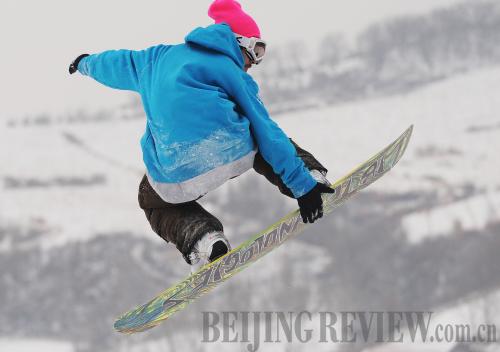|
 |
|
(WANG HAOFEI) |
Solar Term 21: Heavy Snow (Da Xue)
Gregorian date: December 7 or 8
Lunar date: Early in the 11th month
In north China, a farmers' saying goes, "Snow whirls around the time of da xue and dong zhi. It's time for engaging in sideline production and collecting more manure."
Da xue is a time when fertilizer is spread on winter crop fields, and furrows are mounded up between the rows to prevent frost damage. Fertilizer consisting of straw and wood ash should also be spread on fields of grass seed to prevent dry frost. If it's an extremely dry year, the fields should be irrigated to prevent frost damage.
Traditional Chinese medicine believes that in winter months diets should be adapted to focus on enriching the body's yin qi (yin energy) and subduing its yang qi (yang energy), which means people should consume appropriate fats and high protein foods. Winter is also a good time to boost the body's natural constitution and improve symptoms associated with chronic conditions.
Some people may eat too much hotpot or high-calorie foods during winter, which leads to excessive heat accumulation in the lungs and stomach. Other health issues that crop up during the season can include bronchitis, sore throats and skin problems. It's necessary to maintain balance with a certain number of cool dishes and water in winter.
Solar Term 22: Winter Solstice (Dong Zhi)
Gregorian date: December 21 or 22
Lunar date: Middle of the 11th month
During this term, the sun beams almost vertically on the northern hemisphere, and daytime is at its shortest length for the year. Once the solstice has passed, days become increasingly longer. In most Chinese rural areas, farmers take measures against frostbite, start collecting manure and deep ploughing. They also occupy themselves with making sure their domestic animals make it through the winter safely.
After winter solstice, the coldest period of the year starts in the northern part of the country, which is commonly called jin jiu (san jiu is for the three nine-day periods following the winter solstice). South of the Yangtze River, there's a saying that, "People will be one year older after finishing the winter solstice dinner." Commonly called tian sui, it means to grow older.
In ancient China, it was on dong zhi that heaven and ancestor worship was performed. On this day, the emperor would hold a solemn ceremony where common people would offer sacrifices to their late parents and ancestors.
As the tradition of winter solstice has been passed down until now, old and young both worship at the graves of their ancestors on dong zhi. On this day, China's northerners will butcher goats and eat dumplings and wontons, while southerners consume winter solstice rice balls and long noodles.
In some rural areas in the southern province of Zhejiang, a sacrifice is set for the ancestors in the evening, and each family prepares sesame paste cakes and sugared plums to eat and to exchange with their neighbors. A local proverb explains, "If you don't eat sesame paste cakes, you haven't celebrated winter solstice; if you don't celebrate the winter solstice, it will be a cold season." |